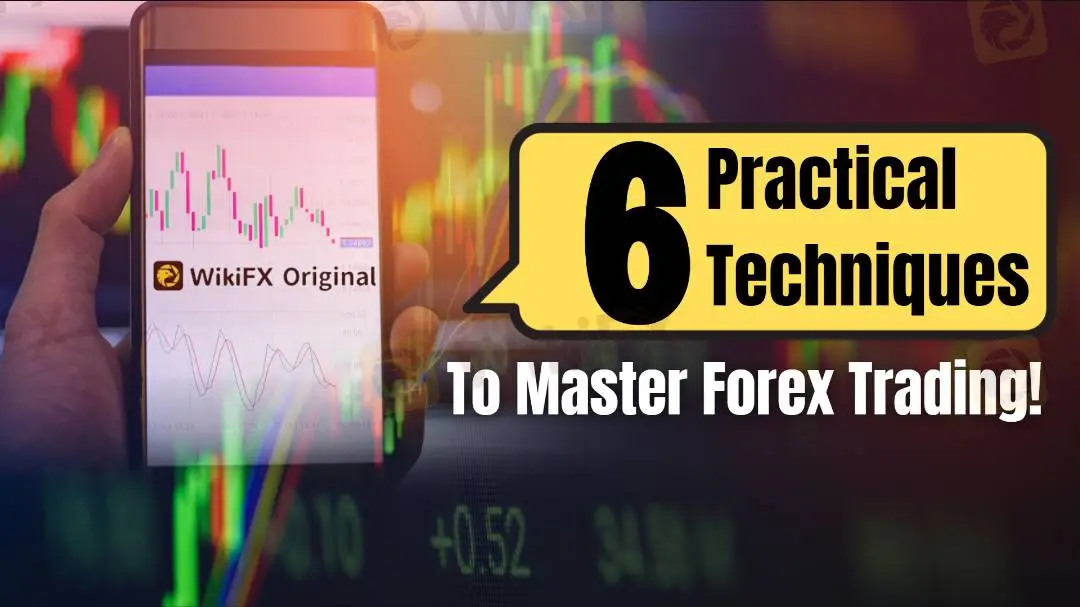简体中文
繁體中文
English
Pусский
日本語
ภาษาไทย
Tiếng Việt
Bahasa Indonesia
Español
हिन्दी
Filippiiniläinen
Français
Deutsch
Português
Türkçe
한국어
العربية
6 Practical Techniques to Master Forex Trading!
Abstract:Whether you are an experienced trading expert or a beginner, choosing the right forex platform and mastering practical trading techniques are crucial for success in the forex market. Today, WikiFX will discuss essential skills that a competent investment trader needs to master.
Whether you are an experienced trading expert or a beginner, choosing the right forex platform and mastering practical trading techniques are crucial for success in the forex market. Today, WikiFX will discuss essential skills that a competent investment trader needs to master.

Trading Mindset Tip 1: Maintain a Clear Mind

The mindset in forex trading is truly crucial. Besides technical factors, having a strong psychological mindset plays a significant role in each trading investment. For many forex trading beginners, they often get too concerned about the initial profits or losses, and even a slight loss can lead to confusion. This can result in a “gambler's mentality,” where they may take reckless risks after facing significant losses, thinking they might as well gamble.
While the success of a trade does not solely rely on a trader's mindset, having the right mentality greatly influences the potential for profits. As forex traders, it is essential to adjust our trading attitudes and maintain a clear mind, avoiding emotional fluctuations driven solely by the desire for profits. Apart from that, discipline is also a vital aspect of a trader's mindset.
Trading Mindset Tip 2: Exercise Patience

As the saying goes, “Patience is a virtue,” and this holds particularly true for forex trading. Whether it's identifying suitable entry and exit opportunities or waiting for the right trading moment, traders need to exercise patience.
From a macro perspective, it's essential for novice traders to understand that becoming a master in forex trading doesn't happen overnight. It requires continuous experience accumulation and improvement of weaknesses, which takes time and dedication to truly grow and develop as a trader.
Trading Mindset Tip 3: Maintain an Equanimous Mind

In the process of growth, maintaining an equanimous mind is also crucial. This means that traders should learn to accept losses and setbacks in their trading journey. To become a mature forex trader, the first step is to embrace losses rather than avoid them out of fear.
During market downturns, many traders tend to avoid checking their accounts, afraid of facing their losses. However, such behavior only leads to further erosion of their assets. A successful trader should approach losses with equanimity because it's an inevitable aspect of forex trading. Only by accepting failures and continuously learning from experiences can true success be achieved. This is what we often refer to as the “ostrich strategy.”
However, more importantly than losses is the need to focus on honing trading skills and accumulating experiences. To achieve this, we should consider the following points.
Trading Execution Tip 1: Learn to Develop a Plan

Having discussed trading mindset techniques, let's now talk about practical actions to take during the trading process. Investing is not an easy task, just like someone wanting to lose weight needs a well-thought-out plan to achieve better results. Similarly, in forex trading, it is crucial to have a detailed trading plan in advance.
Before engaging in any trading activity, it is essential to plan ahead and have a clear and concise process in mind. This includes recording how to enter and exit trades, the frequency of trading, and analyzing the risk-to-reward ratio for each currency pair. Following a well-thought-out plan is more reliable and secure than acting on impromptu ideas.
By planning ahead and adhering to a structured trading strategy, traders can enhance their trading approach and increase their chances of success.
Trading Execution Tip 2: Implement Risk Management

Before initiating any forex trade, it is essential to conduct risk assessment and control on the forex trading platform. During trading, it becomes even more crucial to have robust risk management strategies in place to handle potential losses and keep them within acceptable limits.
Let's discuss the Prospect Theory, one of the four key findings in behavioral finance. According to this theory, individuals tend to make decisions not solely based on wealth considerations but from the perspective of potential gains or losses. They are more concerned about the magnitude of profits and losses.
From the four basic conclusions of Prospect Theory:
A. Most people are risk-averse when facing gains (Certainty Effect).
B. Most people are risk-seeking when facing losses (Reflection Effect).
C. Most people judge gains and losses based on reference points (Reference Dependence).
D. Most people are more sensitive to losses than gains (Loss Aversion).
Why do we mention Prospect Theory? From these conclusions, we can infer that people are unwilling to take risks when facing gains, but they become risk-takers when facing losses. The pain of losses is more sensitive than the joy of gains. Hence, effective risk management becomes crucial, involving steps like minimizing drawdown and setting fixed stop-loss levels.
Trading Execution Tip 3: Prepare Thoroughly Before and After Trading
Forex trading is closely tied to global economic events, making it crucial for traders to stay informed about significant developments worldwide. Economic data, central bank policy decisions, geopolitical tensions, and more can have a significant impact on the forex market. Being sensitive to market dynamics allows you to seize favorable trading opportunities at the right time.
After each trade, maintaining a trading journal becomes a highly valuable habit. By recording the details and thought process behind each trade, you can conduct trade analysis and reviews, identifying the reasons for both successes and failures. Such introspection helps improve trading skills, avoid repeating mistakes, and continuously optimize your trading strategies.
On the path of forex trading, there is no specific technique that can universally apply to every trader, as truly successful strategies are individually created. As a novice trader, the key is not to directly seek techniques, but rather to expand one's trading knowledge, understand global economic dynamics, accumulate long-term trading experience, and learn to record and review each trade. Through such efforts, you will gradually master the essentials of forex trading and become a skilled trader.

Disclaimer:
The views in this article only represent the author's personal views, and do not constitute investment advice on this platform. This platform does not guarantee the accuracy, completeness and timeliness of the information in the article, and will not be liable for any loss caused by the use of or reliance on the information in the article.
Read more

Never Heard of Dynasty Trade? Here's Why You Should Be Worried
Have you heard this name before? No , it’s time you do because staying unaware could cost you. This platform is currently active in the forex trading and has been linked to several suspicious activities. Even if you’ve never dealt with it directly, there’s a chance it could reach out to you through ads, calls, messages, or social media. That’s why it’s important to know the red flags in advance.

Want to Deposit in the EVM Prime Platform? Stop Before You Lose It ALL
Contemplating forex investments in the EVM Prime platform? Think again! We empathize with those who have been bearing losses after losses with EVM Prime. We don't want you to be its next victim. Read this story that has investor complaints about EVM Prime.

WEEKLY SCAM BROKERS LIST IS OUT! Check it now
If you missed this week's fraud brokers list and are finding it difficult to track them one by one — don’t worry! We’ve brought together all the scam brokers you need to avoid, all in one place. Check this list now to stay alert and protect yourself from fraudulent brokers.

Catch the Latest Update on BotBro & Lavish Chaudhary
BotBro, an AI-based trading platform, became popular in India in 2024—but for negative reasons. Its founder, Lavish Chaudhary, who gained a huge following by promoting it heavily on social media. Since then, he has become well-known, but for many controversies. Let’s know the latest update about Botbro & Lavish Chaudhary.
WikiFX Broker
Latest News
WEEKLY SCAM BROKERS LIST IS OUT! Check it now
Apex Trader Funding is an Unregulated Firm | You Must Know the Risks
What WikiFX Found When It Looked Into Aron Markets
Textiles to whisky: U.K.–India 'historic' deal is set to boost bilateral trade by over $34 billion a year
Thailand-Cambodia border clashes: Cambodia's economy has more to lose, analysts say
Puma shares plunge 18% after full-year sales, profit outlook cut on U.S. tariffs
Is Your Forex Strategy Failing? Here’s When to Change
FSMA Warns That Some Firms Operate as Pyramid Schemes
Federal Reserve likely to hold interest rates steady despite pressure from Trump. Here's what that means for your money
Sigma-One Capital Scam? Investors Say They Can’t Withdraw Funds
Currency Calculator


